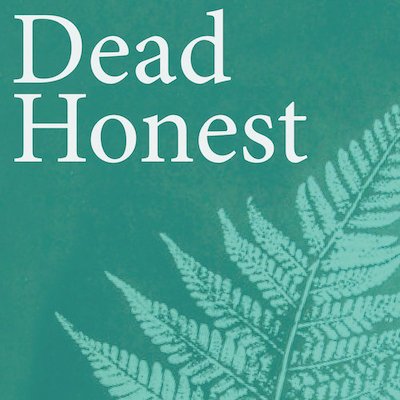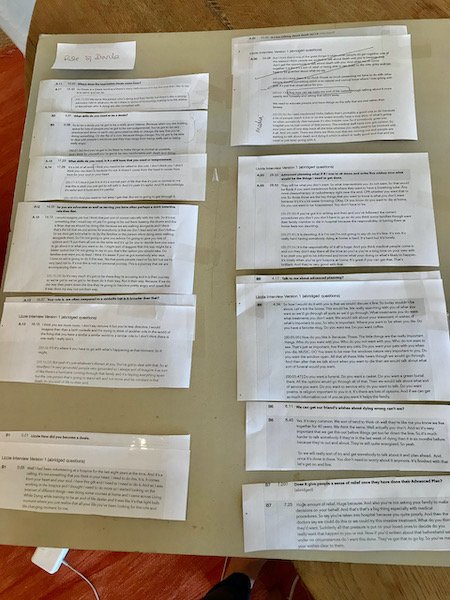Dead Honest: A conversation with Georgie Vestey (part 1)
Georgie Vestey, host of Dead Honest
I’m starting 2022 with another in my series of interviews with independent podcasters. I tend to ask them all the questions I ask myself about why we got into this, our process, and how much the podcasting landscape has changed since we started.
This conversation features Georgie Vestey, host of Dead Honest. Each episode of Dead Honest is an interview with someone who works with the dead or dying. It’s intimate stuff, and yes, some of it is hard to listen to, but I’ve learned so much hearing these people’s stories - not least that what you see of the morgue on TV murder shows is often far from the truth.
Georgie has spent her whole life moving between England and Australia, and is now settled in Sussex. Like my last interviewees, she started her show later in life, in her fifties.
Most of her career has been spent as an advocate for people affected by traumatic loss, which is how she’s come to know the professionals who support us at the most difficult times of our lives.
Ashley Milne-Tyte: Why did you want to do a podcast where you interview these people who are really intimately connected with death in their jobs? When did that idea come about, and why a podcast?
Georgie Vestey: I wanted to tell their stories, not because I thought other people would be interested, it was more because I just thought they're so extraordinary. I want to give them a platform.
People need to know about these people. You know, these people who show up at three o'clock in the morning and stand by the roadside and pick up your dead relative, and who missed their own kid’s school play to sit in a court with you, you know? And I think that's where the imperative came. Tell those stories in the way I wanted to tell them.
So it couldn't really be radio for two reasons. One, I wanted it to be pretty explicit because I didn't want it to be well-meaning radio, “So tell me about your work…” I didn't want that. I wanted it to have grittiness, because one of the things that people don't realize in the wider world, when you're dealing with people who are traumatically bereaved, [outsiders] think the thing that those people want in the first instance is a hug, or words of comfort.
They don't. They want people to give them very practical information. So I approach the conversations I have with these people with that pragmatism. We talk about things that are pretty tough to listen to. It's not voyeuristic. I hope it doesn't come across as voyeuristic. But I can't do that with radio because it's too explicit. I'd be too controlled by an editorial policy of what you have to say and what you can't say. And I'm too old for that. I'm too old to be restrained by that. I chose podcasting because I could afford to do it and I didn't have to rely on anybody else.
With podcasting I can deliver on the platform that I want to deliver to show these people in the light I want to show them in.
Ashley: I have a background in audio but you don’t, so how did you do it? How do you make such a beautiful, carefully edited show? Tell me about what goes into that.
Georgie Vestey: So I had actually done some community radio in Australia and interviewed some vaguely similar types of people to the ones I interview for Dead Honest. But I had the naivety to think that because I’d developed to be a reasonably competent person in my work, and I'd seen these courses about how to podcast in a day, how hard could this be?
And when somebody asked me recently, what was the thing I was proudest about, about Dead Honest, one of the things I'm proudest about is that I actually did it.
“I was so confounded by how incompetent I was. The thing I really struggled with was not just the technology, but my stupidity around it.”
I didn't know how to do stuff that everybody else seemed to be able to do. So for me to have produced something that sounds this good, it is a real labor of love. And I am extraordinarily lucky now to work with another woman called Kate McAll, who helped with the second series, who is a very experienced producer. And she has helped me bring up the sound. But I'm very discerning and I don't apologize for that. I'm what I call a procrastinating perfectionist. The downside of that is it takes me very long to produce anything. And there's a good chance I may not produce anything because I never feel I'm quite ready enough.
You know, there's always a bit more I could be doing. And a lot of that's just straightforward fear, but the other side of that is the perfectionist.
It's a fine line. I think you have to be very careful with podcasting. The very beauty of it is its rough edges sometimes…but I also really dislike podcasts where I don't think there's enough attention spent. For me personally, it’s poor editing of content that puts me off more than poor sound quality. I am much more impatient with that and less indulgent of that. So if somebody is asking me to listen to something, I'm like, ‘Be very respectful of my ears because I'm very respectful of other people's ears.’ And I expect that in return.
Ashley: So you have help, but how involved are you in the edit - are you doing all the audio editing to get these intimate conversations down to about 20 minutes?
George Vestey: I was doing the first cut, and I had a really sweet guy called James, a local guy in the village, who used to come up and do my editing. He used to finish off the edit for me. So I would do the first draft and only I could do that, because editorially I needed to, and I still do that. I still like to have that control over it…but I don’t start there [with the editing software]. I do a transcription, a full transcription. I then cut it up and I paste it onto boards, in bits, you know, my questions, their answers, and then I'll do an edit from that. And then I'll transcribe that again, cut it all up, put it back on the board, move things around, drop things off, put it back on. And so poor James would leave our meetings sometimes clasping a large board with bits of paper floating about stuck on with sellotape.
The editing process
“It’s a bit of a handmade process, but that’s how I worked out how to do it, because I didn’t know how to do it. I didn’t know how to do an edit. ”
I didn't know how you got from 120 minutes of tape down to 20. And so when people say, what's your process? I can make it sound very clear, but what they won't know is that it actually took me six episodes to get to that process by trial and error. So that's how I do it. It's not very elegant, but it sort of works.
Ashley: I always end up talking to people in this series about the massive explosion in podcasting, because when I started it was so different. I'm so glad that I started ten years ago because even though it felt hard then as an independent, given what's happened since around 2015 it just seems like we are completely overwhelmed by big names, big money, big everything. So how have you tackled that?
Georgie Vestey: Yeah, I'm like you, I was naive. Well, I was naive when I went in, but also because I'm such a procrastinator, it took me a very long time to actually get out my first episode. So I started around 2017 and the first episode didn't come out until around 2019.
And at that time I felt reasonably insulated because there were no other real death podcasts out there. So I was in this very niche area that I felt comfortable in, and it wasn't overcrowded. Would I do it now? No, I wouldn't. I wouldn't to be honest, because I don't like podcasting enough now as an industry. I was describing this to a friend the other day.
“Podcasting, when I went into it, felt like a really cool book shop down a back street and every title you picked up, you thought, ‘that could be quite interesting.’”
Now it feels like one of those massive Amazon warehouses that's over-lit and everything looks the same and you are exhausted before you even step foot into it. I wish I could sound more upbeat about it.
So it then becomes the question, how the hell do you get any visibility in this new market? And do you care? Because I'm afraid I'm a little bit like Erica Heilman on that. Bluntly, if I'm enjoying what I'm doing, if I have people coming back to me, saying they're enjoying it, that is really important to me.
“Do I wish I was better at marketing? Absolutely. But if I was better at marketing, I wouldn’t be the sort of person who’d be sitting in the back blocks of some mortuary chatting away to somebody.”
You can't have it both ways. So for me, the thing that has created that visibility, where I have been fortunate, is probably winning the awards in the last 12 months, the British Podcast Award, which I had no intention of entering, I might add.
Kate [my producer] was saying, ‘Are you going to put in an entry?’ And I was like, ‘Why would I bother? [The competition] is going to be the Guardian, Channel Four, the FT, the Times, all these people who've come into the market. I said, ‘What is the point?’
And she said, ‘Well, you never know.’ And I was like, ‘Oh, all right then. Fine.’ And it was so ungracious!
Not only did Georgie enter, but Dead Honest won Best Interview Podcast at the British Podcast Awards 2021. The attention the award brought has led to an uptick in downloads, and more interest from the press. But as Georgie said earlier, what she really wants is to honor the people who do this work: the coroners, chaplains, photographers, and pathology technologists who work with the dead and make life a little more bearable for those left behind.
Georgie Vestey: I got an email after I did one of my episodes on a railway chaplain who supports families after people take their own lives…somebody dies on the British railways every 30 hours. They’re high numbers. And I got this wonderful email from this woman, she'd obviously lost a friend recently who'd taken their life by jumping in front of a train. And she just said, ‘I hadn't heard anyone talk so openly about suicide. And that really helped me.’ And I thought, thank you.
In part two of our interview, coming soon, Georgie and I talk about the pressure to produce on a regular basis, what happens when you’re not feeling creative, and the importance of having a ‘micro-mentor.’


